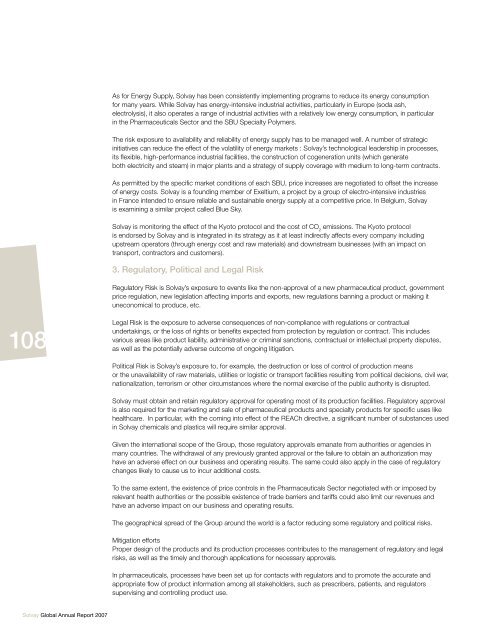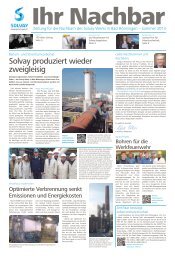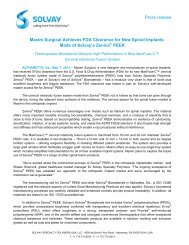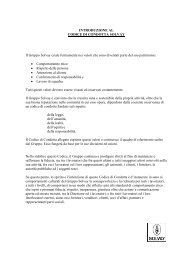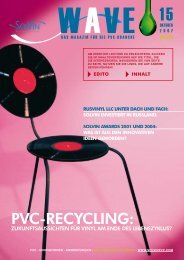+1 - Solvay
+1 - Solvay
+1 - Solvay
Create successful ePaper yourself
Turn your PDF publications into a flip-book with our unique Google optimized e-Paper software.
As for Energy Supply, <strong>Solvay</strong> has been consistently implementing programs to reduce its energy consumption<br />
for many years. While <strong>Solvay</strong> has energy-intensive industrial activities, particularly in Europe (soda ash,<br />
electrolysis), it also operates a range of industrial activities with a relatively low energy consumption, in particular<br />
in the Pharmaceuticals Sector and the SBU Specialty Polymers.<br />
The risk exposure to availability and reliability of energy supply has to be managed well. A number of strategic<br />
initiatives can reduce the effect of the volatility of energy markets : <strong>Solvay</strong>’s technological leadership in processes,<br />
its flexible, high-performance industrial facilities, the construction of cogeneration units (which generate<br />
both electricity and steam) in major plants and a strategy of supply coverage with medium to long-term contracts.<br />
As permitted by the specific market conditions of each SBU, price increases are negotiated to offset the increase<br />
of energy costs. <strong>Solvay</strong> is a founding member of Exeltium, a project by a group of electro-intensive industries<br />
in France intended to ensure reliable and sustainable energy supply at a competitive price. In Belgium, <strong>Solvay</strong><br />
is examining a similar project called Blue Sky.<br />
<strong>Solvay</strong> is monitoring the effect of the Kyoto protocol and the cost of CO 2<br />
emissions. The Kyoto protocol<br />
is endorsed by <strong>Solvay</strong> and is integrated in its strategy as it at least indirectly affects every company including<br />
upstream operators (through energy cost and raw materials) and downstream businesses (with an impact on<br />
transport, contractors and customers).<br />
3. Regulatory, Political and Legal Risk<br />
Regulatory Risk is <strong>Solvay</strong>’s exposure to events like the non-approval of a new pharmaceutical product, government<br />
price regulation, new legislation affecting imports and exports, new regulations banning a product or making it<br />
uneconomical to produce, etc.<br />
108<br />
Legal Risk is the exposure to adverse consequences of non-compliance with regulations or contractual<br />
undertakings, or the loss of rights or benefits expected from protection by regulation or contract. This includes<br />
various areas like product liability, administrative or criminal sanctions, contractual or intellectual property disputes,<br />
as well as the potentially adverse outcome of ongoing litigation.<br />
Political Risk is <strong>Solvay</strong>’s exposure to, for example, the destruction or loss of control of production means<br />
or the unavailability of raw materials, utilities or logistic or transport facilities resulting from political decisions, civil war,<br />
nationalization, terrorism or other circumstances where the normal exercise of the public authority is disrupted.<br />
<strong>Solvay</strong> must obtain and retain regulatory approval for operating most of its production facilities. Regulatory approval<br />
is also required for the marketing and sale of pharmaceutical products and specialty products for specific uses like<br />
healthcare. In particular, with the coming into effect of the REACh directive, a significant number of substances used<br />
in <strong>Solvay</strong> chemicals and plastics will require similar approval.<br />
Given the international scope of the Group, those regulatory approvals emanate from authorities or agencies in<br />
many countries. The withdrawal of any previously granted approval or the failure to obtain an authorization may<br />
have an adverse effect on our business and operating results. The same could also apply in the case of regulatory<br />
changes likely to cause us to incur additional costs.<br />
To the same extent, the existence of price controls in the Pharmaceuticals Sector negotiated with or imposed by<br />
relevant health authorities or the possible existence of trade barriers and tariffs could also limit our revenues and<br />
have an adverse impact on our business and operating results.<br />
The geographical spread of the Group around the world is a factor reducing some regulatory and political risks.<br />
Mitigation efforts<br />
Proper design of the products and its production processes contributes to the management of regulatory and legal<br />
risks, as well as the timely and thorough applications for necessary approvals.<br />
In pharmaceuticals, processes have been set up for contacts with regulators and to promote the accurate and<br />
appropriate flow of product information among all stakeholders, such as prescribers, patients, and regulators<br />
supervising and controlling product use.<br />
<strong>Solvay</strong> Global Annual Report 2007


